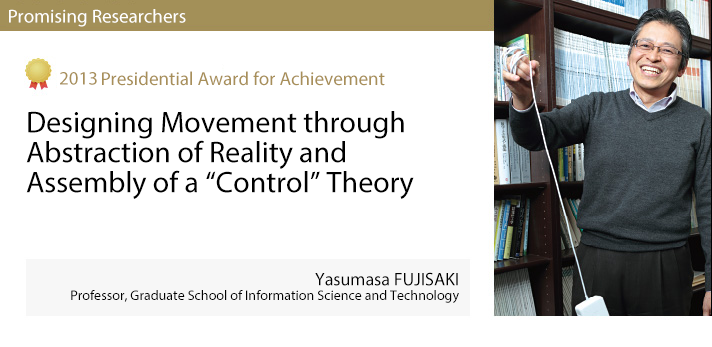Designing Movement through Abstracion of Reality and Assembly of a "Control" Theory
Yasumasa FUJISAKI, Professor, Graduate School of Information Science and Technology

"This is how I often explain the basics of control to my students," explained a smiling Professor Yasumasa FUJISAKI as he swing around a nearby AC adapter.
The first step to theoretical study is to first abstract the system in question, and then express it using mathematical models. Because this is an abstract model, it can have wide-ranging applications. For example, Professor Fujisaki's "Two-degree-of-freedom servo system" has been applied to systems developed by Honda which increase the control stability of four wheel steering automobiles.
In addition to performing theoretical studies, Professor Fujisaki also emphasizes the importance of observing activity in the field, an attitude further deepened by his experience in the industrial realm. "By reexamining whether or not a theory can be used in the real world, the second step of research has already begun. One must refine a particular theory by being conscious of the difference between a theory's application in the laboratory and in the field."
Currently, Professor Fujisaki is incorporating theories of information science into a "dependable control theory" which allows for the creation of a networked control system which will not go down even under unforeseen conditions. This research was adopted by the large scale competitive research fund CREST, which became the reason for its selection for the Award.
For Professor Fujisaki, two essential items for his research are a white board and a pen. During sessions with other researchers, ideas begin to take shape right on the white board. "While doing research abroad at the Polytechnic University of Turin, I felt that this style of constantly moving discussions was quite a fresh approach," said a smiling Professor Fujisaki, who is always looking to take that next step while cheerfully discussing research with his students.
About Professor Fujisaki
Born in 1964, Professor Yasumasa FUJISAKI completed his master's degree in 1988 at Kobe University's Graduate School of Engineering, specializing in systems engineering. That same year he became a researcher at the Electronics Research Laboratory at Kobe Steel, Ltd. (KOBELCO). After serving as an assistant and assistant professor at Kobe University's Faculty of Engineering, Professor Fujisaki took his current position as a professor at the Graduate School of Information Science and Technology, Osaka University. He also holds his doctorate in Engineering.
Interview held in March 2014
